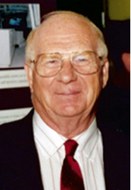
A Canadian pioneer in nuclear chemistry with an inspiring love for science and engineering, Professor Emeritus Robert E. Jervis (ChemE) passed away May 21 on his 87th birthday.
Professor Jervis was born in Toronto and raised during the depression years. He obtained an undergraduate degree in math, physics and chemistry in 1949, an M.A. in 1950 and a PhD in physical chemistry in 1952, all from the University of Toronto. He subsequently worked at the Chalk River nuclear research facility, where he used applied nuclear chemistry to develop novel methods of trace element analysis in the environment.
Jervis joined U of T’s Department of Chemical Engineering and Applied Chemistry in 1958, where he continued his research in applied analytical and environmental chemistry for the next five decades. His research focused on the peaceful use of nuclear energy in industry, life sciences and forensic sciences. His work on human exposure to heavy metals garnered him significant national and international recognition.
Jervis also pioneered the use of trace elements to identify sources of pollution, and to assess the environmental impact of fossil fuel combustion. He similarly developed this technique in forensics, where he used trace elements in hair as bioindicators of exposure to environmental pollutants. This method was used to study arsenic levels in gold miners, mercury in aboriginal people and lead in urban children.

Professor Robert Jervis (left) with students at Chemical Engineering Open
House, 1964 (Photo: Heritage University of Toronto).
Jervis’ work took him around the world lecturing and consulting with scientists and scientific bodies, and as a visiting professor at the University of Tokyo, University of Cambridge and University of Kuala Lumpur. He published over 250 scientific papers.
He also received numerous awards and honours throughout his career, including: the Lewis Medal, Canada’s highest nuclear scientific award; the international Hevesy Medal, for radioanalytical chemistry; the American Nuclear Society’s Emmon Medal; and, the inaugural Russian Academy of Science’s Ressovsky Medal. He was a fellow of the Royal Society of Canada, the Canadian Nuclear Society, the Canadian Society for Chemistry and an honorary fellow of the Atomic Energy Society of Japan and the Indian Academy of Sciences.
Jervis’ deepest professional satisfaction came from inspiring first-year students to love the field of science. As a testament to the impact he had in the classroom, in 1992 a group of his former students established the R.E. Jervis Award, which recognizes a graduate student each year for outstanding work in nuclear engineering, with support from the Canadian Nuclear Society.




